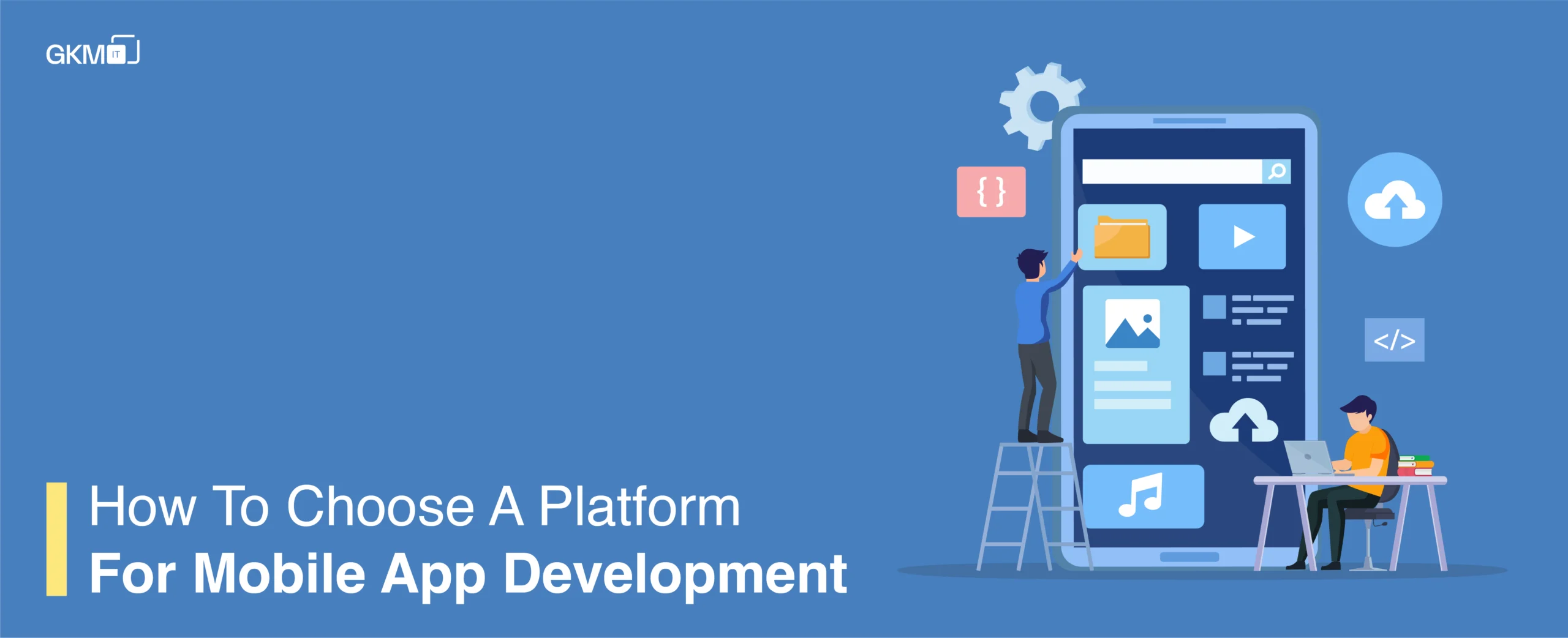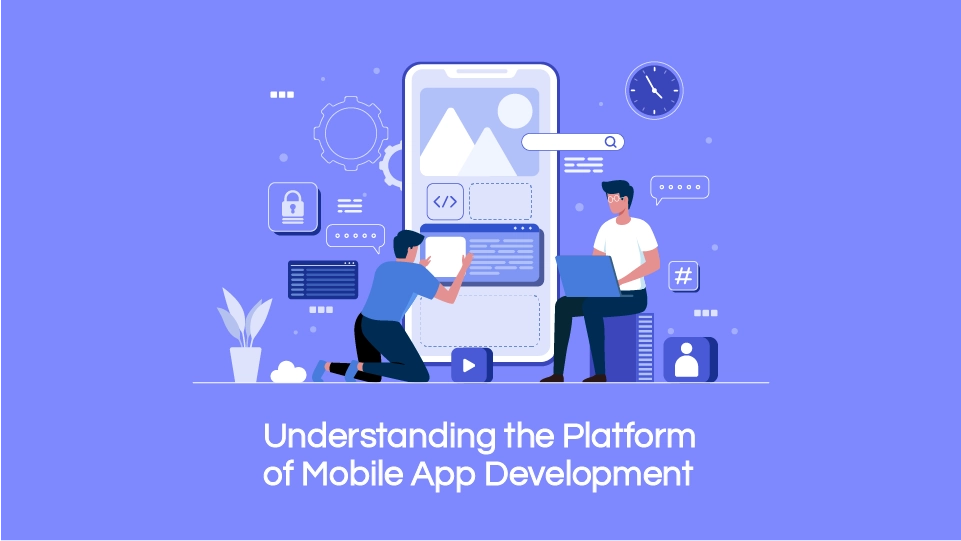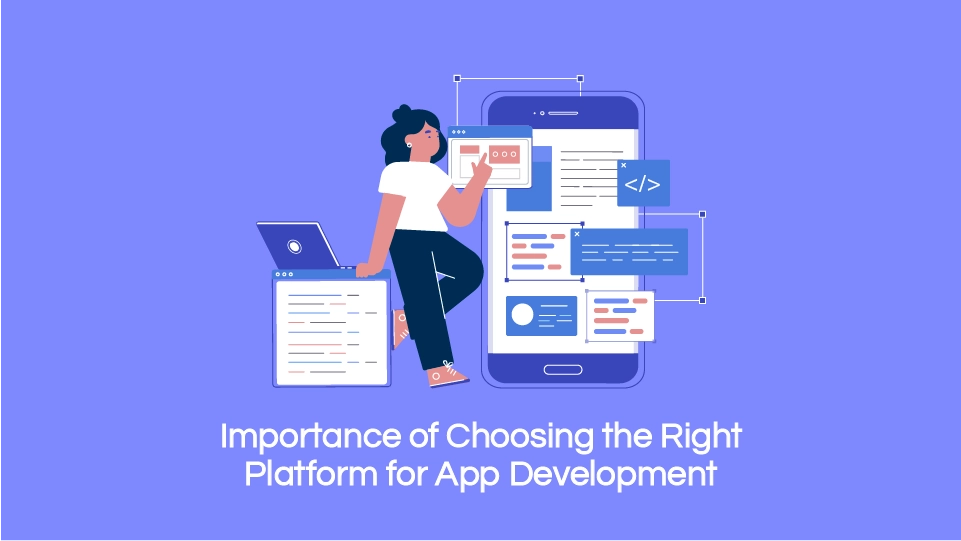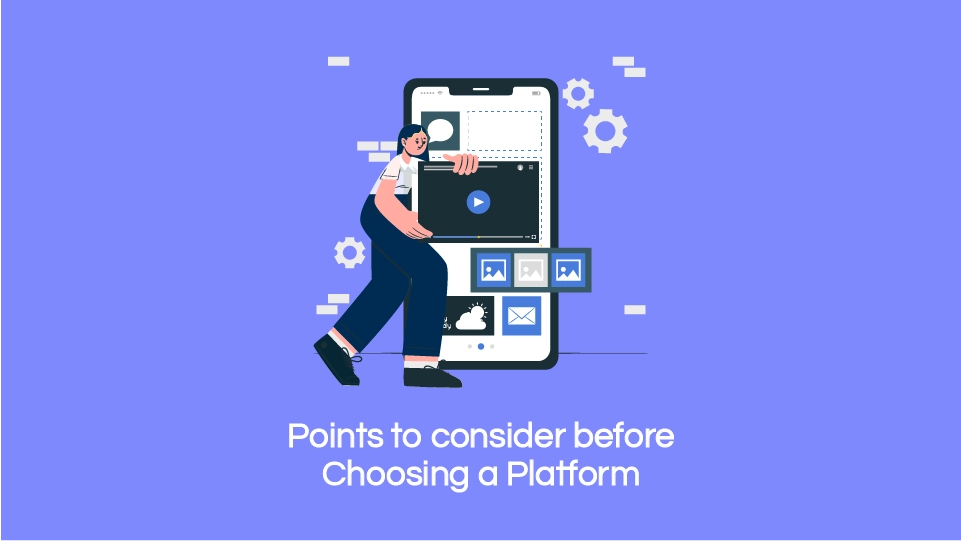
How to Choose a Platform for Mobile App Development ?
The advancement of digital technology has made mobile apps become an integral part of our daily lives. Due to the boom in the number of mobile users, creating mobile apps to run businesses has become a requisite. If you are a business owner or planning to start up a business, then this article will help you choose the right platform for mobile app development.
Before we move further into the topic, we’d like you to have an overview of the market. According to Statista, the year 2023 is expected to witness the annual number of app downloads surpassing 299 billion and generating more than 935 billion Dollars in revenue.
Fun Fact: Data.ai reported that people spend about 4.8 hours daily on mobiles, making mobile apps a good source of business for all.
We’ll start from the basics; mobile application development is the process of developing software for electronic devices such as mobile phones and tablets. These software are commonly created for Android and iOS operating systems that can either be pre-installed or downloaded from the app store or can be accessed via mobile web browser.
Table of Contents
- What is meant by Platform for Mobi app development, Why it is important
- What are the three platforms for mob app development
- What to consider before choosing a platform for mob app development
- Conclusion
Understanding the Platform of Mobile App Development

A platform for mobile application development is a software or framework that helps developers build, test, and launch mobile apps. It provides tools and resources to create apps for specific devices or operating systems. These platforms make app development more accessible, faster, and compatible across various devices and operating systems.
Platforms for Mobile App Development:
There are three types of platforms used for developing apps:
- iOS
- Android
- Cross-platform
Before we further discuss these platforms, it is also crucial to understand the types of apps that can be created- Native or Hybrid. Native apps are built using platform-specific languages like Swift or Objective-C for iOS and Java or Kotlin for Android. They optimize the native APIs and frameworks provided by the operating system. Hybrid apps use web technologies like HTML, CSS, and JavaScript to be developed. They run inside a container, typically a WebView, and are wrapped in a native shell using frameworks like Cordova or React Native.
iOS:
iOS is Apple’s mobile operating system used on devices like iPhones and iPads. It offers a consistent user experience, a high-quality app store, and a strong emphasis on security. iOS apps are primarily developed using Apple’s programming language, Swift, and the Xcode development environment. Apple products are mostly used by affluent people, hence this platform is great for monetization
Android:
Android is an open-source mobile operating system that Google has developed. It powers a wide range of devices from different manufacturers. Android offers flexibility, customization options, and access to a vast user base. Android apps are primarily developed using Java or Kotlin programming languages and the Android Studio IDE. The majority of the population uses Android phones. Hence, this platform comes in handy when you are targeting a broader audience.
Cross-Platform:
Cross-platform development frameworks, such as React Native, Flutter, and Xamarin, enable developers to build apps compatible enough to run on multiple platforms using a single codebase. These frameworks leverage web technologies like HTML, CSS, and JavaScript to create native-like applications. Opting for this platform would save businesses both time and costs, and it can efficiently be run on all mobile platforms.
Importance of Choosing the Right Platform for App Development

There are three main reasons why it is necessary to choose the right platform for developing a mobile application:
- User Reach & Market Penetration
- Development Cost & Time
- App Performance and User Experience
User Reach and Market Penetration:
Selecting the appropriate platform allows developers to target the maximum number of potential users. Different platforms have varying market shares and user bases. For example, iOS and Android dominate the mobile market, but they have distinct user demographics. By understanding the target audience and their preferred platform, developers can optimize their app’s visibility, reach, and potential for success.
Development Cost and Time:
The choice of platform can significantly impact the development timeline and costs. Each platform has its development requirements, programming languages, and software development kits (SDKs). By selecting a platform that aligns with the developers’ skills and expertise, they can reduce the learning curve and development time. Additionally, developing for a single platform initially can help manage costs before expanding to other platforms.
App Performance and User Experience:
Different platforms have varying hardware specifications, software frameworks, and user interface guidelines. Choosing a platform that is well-suited to the app’s requirements and aligns with the user experience expectations can ensure optimal performance, responsiveness, and user satisfaction. Customizing the app for each platform can enhance its functionality and usability.
Tips to Consider Before Choosing a Mobile App Development Platform

It is very important to have a clear understanding of what you wish to achieve through the mobile application that you are developing. The following are the factor you need to keep in mind before developing an app:
- Target Audience
- Mobile App Requirements and Features
- App Development Resources
- Launch & Monetization of Mobile Application Development
Target Audience:
Targeting the right audience for your business is the first step. It is crucial to gain an understanding of the demographics, preferences, and behaviors of the target audience. One must also consider factors such as the platform’s market share, user demographics, and device popularity to align the app with the target audience’s preferences.
Mobile App Requirements and Features:
Make a list of the app’s requirements, complexity, and desired features. Some platforms may provide better support for specific functionalities or integrations. Examine whether the platform’s capabilities align with the app’s goals and desired user experience.
App Development Resources and Expertise:
Evaluate the costs, development team’s skills, expertise, and familiarity with the specific platforms. Based on the evaluations, it would be easier to conclude what resources can be utilized for the chosen platform.
Launch & Monetization of Mobile Application Development:
Consider the urgency of launching the app and the time required for development and deployment on different platforms. Some platforms may offer faster dev
elopment cycles, while others may have more stringent app review processes that could affect the time to market.
Analyze the chosen platform for its payment systems, in-app purchase capabilities and advertising frameworks. It has commonly been noticed that the iOS users have a higher willingness to pay for apps, whereas Android users mostly prefer ad-based revenue models.
Also Read –Top Mobile App Development Trends 2023
Conclusion:
Selecting the right platform for mobile app development is a critical decision that significantly impacts the success of an app. Whether opting for iOS, Android, or cross-platform development, one must carefully evaluate and plan accordingly to create a successful mobile app that resonates with users and achieves the desired objectives. We hope you found our blog informative. To read more blogs related to Mobile App Development, visit gkmit.co.